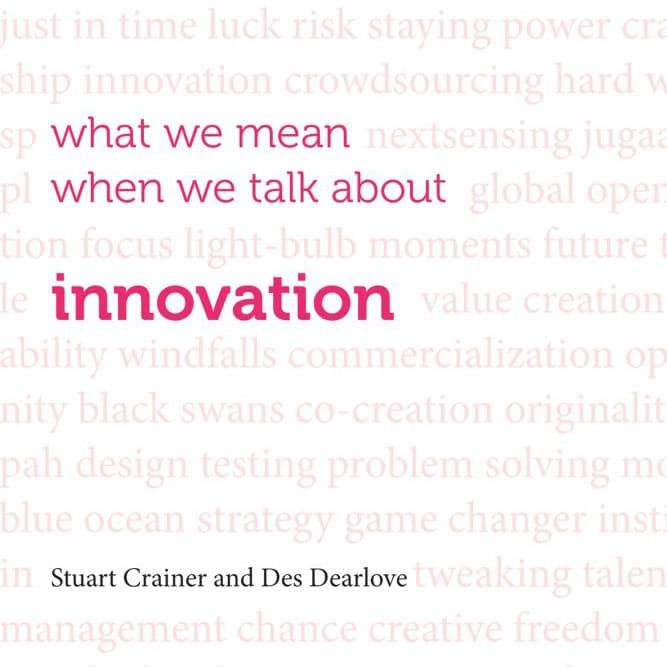

“You can’t tell how quickly the future is going to happen. But what you can know is that you need to go in that direction because all the things that you try and fail with in the meantime teaches you how to get it right when the time is right. So I always talk about building the innovation muscles so that you can be ready for that moment you need to sprint,” Nilofer Merchant told us.
Received wisdom from Silicon Valley to Shenzhen via London’s Silicon Roundabout is that failure is an inevitable part of the innovation process. You fall off the bike and get back on. Entrepreneurs and innovators quote Samuel Beckett’s entreaty to fail and then fail again with empty abandon. We are told that the best inventors, entrepreneurs and those with lead in their innovative pencil, all have an appetite for failing and learning from it. This may well be true for a small percentage of the human race. But, the reality for most people is that failure is not their preferred option. Failure will lead to humiliation, demotion, poverty or worse. Failure, in short, is over-rated. Massively.
There is another way. Ben Slater of the growth consultancy Bow & Arrow argues there is such a thing as fail-proof innovation. “There’s definitely such a thing as fail-proof innovation,” he says with persuasive emphasis on the word definitely. “We’ve launched a huge amount of products that have been extremely successful using our process. When you read about innovation in blogs, articles, speeches there is a train of thought that failure is a really good thing, ‘embrace failure’, ‘fail fast’, ‘fail hard’, ‘learn from your failure’, etc., and we completely and utterly disagree with that. We think failure’s terrible. Jobs get lost when people fail. No-one was born with a gene that says they want to fail and everything must be done to eliminate failure. We’re solely driven by delivering success in the market. Our process has identified every potential pitfall that we work with our clients to overcome. Whenever we have seen failure, its usually because one of those pain points has been ignored.” Message: forget about failing; deal with it if and when it happens.
Another perspective comes from Matt Kingdon of the creative consultancy What If?!. “It’s a funny thing, fear of failure in a large organization,” he reflected when we spoke. “If you talk to senior people in an organization, they often say that they want the people underneath them to take more risks. If you talk to the people underneath them, they talk about their bosses and say the bosses won’t let them take more risks. I think there’s something going on that is holding people back, and the answer to it is to lower the stakes. Take many more risks, but take much smaller risks, things that you can do maybe under the radar, things that are easy to do by Friday, rather than things that you can only do over the next few months and that require huge capital expenditures.”
Matt Kingdon’s second suggestion is characteristically, well, creative: “The grapevine is one of the most powerful ways of making something happen or killing something in an organization. Now, the grapevine in a company, the gossip structure, needs feeding with stories of innovation success.
“So, it’s about taking a small risk, getting something to happen, and telling the story about what happened, so that your innovation drive can gather credibility. You can make things happen because people see things happening. They see the output, the impact of what you’re doing. So, smaller risks and stories, these are the two things that are within the control of people at whatever level in an organization. And you’ll find that people at a very senior level in an organization very much like telling stories about some of the troops who have maybe stepped a little bit out of line, and maybe done the right thing for the company. They’ve respected the company, but they haven’t necessarily revered it. They’ve made something happen. There is a huge hunger within an organization for stories about people who are making a difference—the unsung heroes, if you like.”
Again, there is nothing approaching rocket science in this sensible advice. Failure is educational but only manageable if it is small-scale. Putting a positive spin on failure requires strong leadership and a supportive culture – both are rare. The bigger the failure the more expensive and, we suspect, the more likely that its legacy is trauma rather than development.
Resources
Matt Kingdon, The Science of Serendipity, Wiley, 2013
This was originally published in What we mean when we talk about innovation by Stuart Crainer and Des Dearlove (Infinite Ideas, 2016).

Thinkers50 Limited
The Studio
Highfield Lane
Wargrave RG10 8PZ
United Kingdom

Thinkers50 Limited
The Studio
Highfield Lane
Wargrave RG10 8PZ
United Kingdom

| Cookie | Duration | Description |
|---|---|---|
| LANG | 9 hours | Linkedin set this cookie to set user's preferred language. |
| nsid | session | This cookie is set by the provider PayPal to enable the PayPal payment service in the website. |
| sp_landing | 1 day | The sp_landing is set by Spotify to implement audio content from Spotify on the website and also registers information on user interaction related to the audio content. |
| sp_t | 1 year | The sp_t cookie is set by Spotify to implement audio content from Spotify on the website and also registers information on user interaction related to the audio content. |
| tsrce | 3 days | PayPal sets this cookie to enable the PayPal payment service in the website. |
| x-pp-s | session | PayPal sets this cookie to process payments on the site. |
| __cf_bm | 30 minutes | This cookie, set by Cloudflare, is used to support Cloudflare Bot Management. |
| Cookie | Duration | Description |
|---|---|---|
| l7_az | 30 minutes | This cookie is necessary for the PayPal login-function on the website. |
| Cookie | Duration | Description |
|---|---|---|
| CONSENT | 2 years | YouTube sets this cookie via embedded youtube-videos and registers anonymous statistical data. |
| _ga | 2 years | The _ga cookie, installed by Google Analytics, calculates visitor, session and campaign data and also keeps track of site usage for the site's analytics report. The cookie stores information anonymously and assigns a randomly generated number to recognize unique visitors. |
| _gat_gtag_UA_10408481_1 | 1 minute | Set by Google to distinguish users. |
| _ga_ZP8HQ8RZXS | 2 years | This cookie is installed by Google Analytics. |
| _gid | 1 day | Installed by Google Analytics, _gid cookie stores information on how visitors use a website, while also creating an analytics report of the website's performance. Some of the data that are collected include the number of visitors, their source, and the pages they visit anonymously. |
| Cookie | Duration | Description |
|---|---|---|
| NID | 6 months | NID cookie, set by Google, is used for advertising purposes; to limit the number of times the user sees an ad, to mute unwanted ads, and to measure the effectiveness of ads. |
| test_cookie | 15 minutes | The test_cookie is set by doubleclick.net and is used to determine if the user's browser supports cookies. |
| VISITOR_INFO1_LIVE | 5 months 27 days | A cookie set by YouTube to measure bandwidth that determines whether the user gets the new or old player interface. |
| YSC | session | YSC cookie is set by Youtube and is used to track the views of embedded videos on Youtube pages. |
| yt-remote-connected-devices | never | YouTube sets this cookie to store the video preferences of the user using embedded YouTube video. |
| yt-remote-device-id | never | YouTube sets this cookie to store the video preferences of the user using embedded YouTube video. |
| yt.innertube::nextId | never | This cookie, set by YouTube, registers a unique ID to store data on what videos from YouTube the user has seen. |
| yt.innertube::requests | never | This cookie, set by YouTube, registers a unique ID to store data on what videos from YouTube the user has seen. |
| Cookie | Duration | Description |
|---|---|---|
| DEVICE_INFO | 5 months 27 days | No description |
| loglevel | never | No description available. |
| m | 2 years | No description available. |
Thinkers50 Limited has updated its Privacy Policy on 28 March 2024 with several amendments and additions to the previous version, to fully incorporate to the text information required by current applicable date protection regulation. Processing of the personal data of Thinkers50’s customers, potential customers and other stakeholders has not been changed essentially, but the texts have been clarified and amended to give more detailed information of the processing activities.